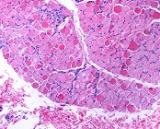CMS HEDIS and Stars Pharmacy Overview—Medication Adherence, Statin Use in Patients and More

Participants in this activity will learn how CMS measures medication adherence, its role in patient qualification status, impact on claims algorithms, and potential caveats of these determinations. Strategies to address common barriers to medication adherence will be discussed, along with best practices that may improve adherence. In addition, the five measures included in the 2021 Medicare Part D star ratings, including those regarding medication adherence for diabetes, hypertension, cholesterol, as well as statin use in persons with diabetes, will be reviewed.
Category
- Disease management
Format
- Webcasts
Credits
- 2.00 ACPE - Pharmacists
- 2.00 ACPE - Pharmacy Technicians
- 2.00 AMA - Physicians
- 2.00 ANCC - Nurses
- 2.00 APA - Psychologists
- 2.00 Attendance - General Attendance
- 2.00 ASWB - Social Workers
Providing Quality Care for Adults With Intellectual and Developmental Disabilities

This activity will provide learners with an overview of clinical considerations in adults with IDD and improve communication skills and practices that can better guide treatment choices to address the specific needs of these individuals. Learners will take a closer look at existing bias, stigma and discrimination toward these individuals and learn strategies to address these issues in practice. Lastly, the value of improved interprofessional team collaboration between health care professionals (HCPs), caregivers and direct support professionals will be discussed.
Category
- Intellectual and developmental disabilities
Format
- Webcasts
Credits
- 2.00 ACPE - Pharmacists
- 2.00 ACPE - Pharmacy Technicians
- 2.00 AMA - Physicians
- 2.00 ANCC - Nurses
- 2.00 APA - Psychologists
- 2.00 Attendance - General Attendance
- 2.00 CCMC - General - Case Managers
- 2.00 CDR - Dietitians
- 2.00 COPE - Optometrists
- 2.00 ASWB - Social Workers
Beyond the Video Visit: A Complete Guide to Digital Health Modalities

This activity will explore a variety of digital health modalities and help learners understand the broad landscape of digital medicine and beyond. It will discuss the potential for these modalities to enhance health care delivery, offer increased access to health care and ultimately improve patient outcomes.
Category
- Digital health
Format
- Webcasts
Credits
- 1.00 ACPE - Pharmacists
- 1.00 ACPE - Pharmacy Technicians
- 1.00 AMA - Physicians
- 1.00 ANCC - Nurses
- 1.00 APA - Psychologists
- 1.00 Attendance - General Attendance
- 1.00 CCMC - General - Case Managers
- 1.00 ASWB - Social Workers
Duchenne Muscular Dystrophy: Utilizing Personalized Treatments and Addressing Health

This activity will discuss emerging therapies for DMD and the importance of incorporating a personalized interprofessional care plan, along with the role of health disparities and how these impacts access to care and outcomes for these individuals.
Category
- Disease management
- Health equity
- Rare diseases
Format
- Webcasts
Credits
- 1.00 ACPE - Pharmacists
- 1.00 ACPE - Pharmacy Technicians
- 1.00 AMA - Physicians
- 1.00 ANCC - Nurses
- 1.00 APA - Psychologists
- 1.00 Attendance - General Attendance
- 1.00 CCMC - General - Case Managers
- 1.00 ASWB - Social Workers
Impact of Climate Change on Behavioral Health

This activity will examine the mental health effects of climate change and climate-related events on individuals and provide an overview of the populations more vulnerable to these impacts, including people with mental health issues, chronic health conditions, and those of poorer social determinants of health (SDOH), which include lower socioeconomic status, decreased access to quality health care, poorer environmental conditions, and heightened levels of experienced discrimination and bias. The negative impact of climate change on health disparities and community wellbeing will also be examined. A discussion of strategies that can mitigate the negative mental health effects of climate change, support individual resilience, improve the relationships between patients and their health care professionals, and promote positive outcomes will be discussed.
Category
- Behavioral health
Format
- Webcasts
Credits
- 1.00 AMA - Physicians
- 1.00 ANCC - Nurses
- 1.00 APA - Psychologists
- 1.00 Attendance - General Attendance
- 1.00 ASWB - Social Workers
Supratentorial Matters Associated with Obesity

This activity focuses on the physiological processes that occur in obesity and cause fundamental changes in neurocircuitry that impact mental and physical health, sleep, aging, and the experience of pain. Participants will examine the cycle of obesity and how bias, stigma, discrimination, and adverse childhood experiences (ACEs) negatively contribute to these mental and physical effects.
Category
- Disease management
- Wellness
Format
- Webcasts
Credits
- 1.00 ACPE - Pharmacists
- 1.00 ACPE - Pharmacy Technicians
- 1.00 AMA - Physicians
- 1.00 ANCC - Nurses
- 1.00 Attendance - General Attendance
- 1.00 CDR - Dietitians
Pharmacotherapy Principles and Considerations for Weight Management

This activity will review the rationale, mechanisms of action, and indications for current FDA-approved anti-obesity pharmacotherapies, as well as explore medications that have weight-loss-promoting potential.
Category
- Disease management
- Wellness
Format
- Webcasts
Credits
- 1.00 ACPE - Pharmacists
- 1.00 ACPE - Pharmacy Technicians
- 1.00 AMA - Physicians
- 1.00 ANCC - Nurses
- 1.00 Attendance - General Attendance
- 1.00 CDR - Dietitians
Medical Weight Loss Overview

This activity will provide an overview of obesity as a complex and chronic disease, will review its classification, and will examine the factors that cause weight loss to be so challenging to sustain. Participants will also explore how the aspects of the medical weight loss (MWL) program are structured to promote sustainability.
Category
- Disease management
- Wellness
Format
- Webcasts
Credits
- 1.00 ACPE - Pharmacists
- 1.00 ACPE - Pharmacy Technicians
- 1.00 AMA - Physicians
- 1.00 ANCC - Nurses
- 1.00 Attendance - General Attendance
- 1.00 CDR - Dietitians
Supporting Resiliency in Older Adults: A Focus on Life’s Purpose

This activity will provide an overview of the role of resilience and PIL, examine characteristics associated with resilience and PIL and describe intervention strategies to promote resilience and successful aging in older adults.
Category
- Behavioral health
- Health equity
- Older adults
Format
- Webcasts
Credits
- 1.00 ACPE - Pharmacists
- 1.00 ACPE - Pharmacy Technicians
- 1.00 AMA - Physicians
- 1.00 ANCC - Nurses
- 1.00 APA - Psychologists
- 1.00 Attendance - General Attendance
- 1.00 CCMC - General - Case Managers
- 1.00 ASWB - Social Workers
Preventing Falls in Older Adults: Risk Factors and Interventions

This activity will discuss The Strategies to Reduce Injuries and Develop Confidence in Elders (STRIDE) trial, which aims to evaluate the effectiveness of evidence-based strategies to reduce serious fall-related injuries,. In addition, faculty will identify risk factors that contribute to falls in the older adult as well as for individuals in SNFs, and provide interventions to reduce the risk of falls. The importance of a multidisciplinary approach in fall management will also be explored.
Category
- Disease management
Format
- Webcasts
Credits
- 1.00 ACPE - Pharmacists
- 1.00 ACPE - Pharmacy Technicians
- 1.00 AMA - Physicians
- 1.00 ANCC - Nurses
- 1.00 APA - Psychologists
- 1.00 Attendance - General Attendance
- 1.00 ASWB - Social Workers

 Facebook
Facebook Twitter
Twitter LinkedIn
LinkedIn Forward
Forward